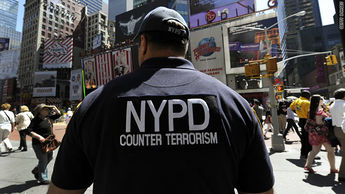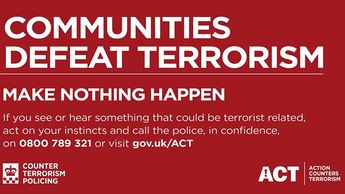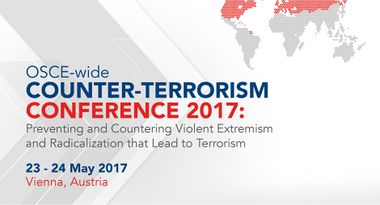"Counter-terrorism"
(polarising perspective, Orwellian language, plastic word, “Terrorism/Preparation”, hero image) | |
|---|---|
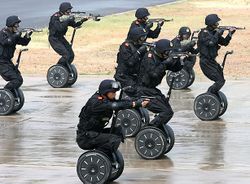 | |
| Interest of | • Anne Aly • Club de Berne • Jonathan Davis • Global Counter-Terrorism Coordination Compact • James Hart • International Centre for Counter-Terrorism • Le Cercle • Nikita Malik • Ken Moskow • Office for Security and Counter-Terrorism • Powerbase • Rianne Siebenga • Mike Smith • Spinwatch • Jim Steele • Hunter Treseder • University of St. Andrews |
| A component of the military-industrial-terrorism-congressional complex which has seen a dramatic growth since 9-11. Originally referred to special forces trained in terrorist warfare, it became a broader meaning for loss of civil liberties and a culture of fear and mistrust. | |
Easily confused with "terrorism", which is what they do, not what we do.[1]
"Counter-terrorism" (or "counterterrorism") is modern element of the military-industrial-terrorism-congressional complex. After September 11, 2001 governments and commercially-controlled media promoted the concept of the "war on terror", causing a boom for the MICC in general, in particular for manufacturers of weapons and mass surveillance equipment.
Contents
Official narrative
"Counter-terrorism" is a no holds barred effort to oppose "terrorism". Although they may use similar means, "counter-terrorists" are the very opposite of "terrorists".
History
Douglas Valentine reports that in or around 1964 the CIA set up "counter terror teams" as a part of Project Phoenix. These groups were used to try to terrorise villagers away from support of the Vietcong and they used informers to identify Vietcong members in rural areas.[2] These were later renamed "Provincial Reconnaissance Units" after CIA officials "became wary of the adverse publicity surrounding the use of the word 'terror'".[3]
JCIT
The 1979 JCIT was an important meeting to establish and standardise the modern ideology of "terrorism", "counter-terrorism" and the "war on terror". At least 4 of the speakers at that meeting had attended one or more meetings of Le Cercle, a group with links to the SOE. Many Cercle members also have set up "terrorism research" organisations to promote their narrative and offer jobs and publicity to "terror experts".
Methods
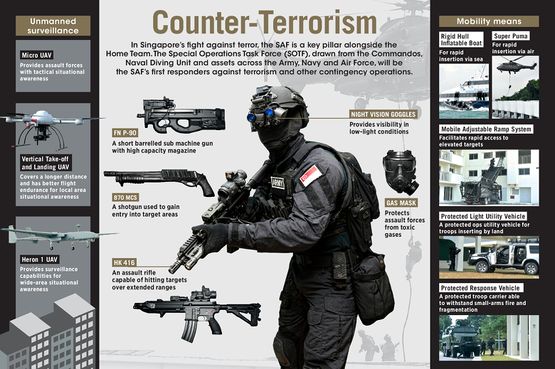
In some countries, "counter-terrorists" are legally permitted to use violent methods such as assassinations or torture[citation needed] to oppose "terrorists". These is rarely referred to as such - alternative language such as "targeted killings" or "preemptive neutralization" is preferred.[4]
"Terrorism research"
- Full article:
 Terrorism research
Terrorism research
- Full article:
"Terrorism research" is conducted by a number of research institutions, perhaps most notably the Centre for the Study of Terrorism and Political Violence at the University of St. Andrews. The discipline has minimal academic rigour and is for the most part not empirically based. Nafeez Ahmed has gone so far as to call it "bullshit".[5] Given its lack of explanatory power, one might wonder why such an academic discipline continues without a serious shake up. A historical comparison might clarify the role of this 'pseudoscience' might help - in the middle ages, witches were tracked down supposedly by experts in witchfinding. The RAND Corporation/St Andrews database has literally nothing to say about false flag terror - it simply excludes such events.
Militarization
In US in particular, many groups such as police forces and intelligence agencies have developed "counter-terrorism" branches which have been criticised for profiling (and sometimes harassing) non-violent, law-abiding activists such as peace campaigners. Their lack of oversight and close liaison with corporations have been criticised, especially the establishment of quasi-autonomous fusion centers.[6]
Often these special forces are created in the immediate aftermath of a violent "terrorist" incident, such as the National Investigation Agency, which was created in response to the 2008 Mumbai attacks.
Counter-terrorist hotlines
Many countries are encouraging people to report "suspicious behaviour". This is sometimes left undefined, but sometimes a checklist is published, such as "appearing to study CCTV or other security arrangements".[7]
Extent
Many national governments are engaged in the business of "counter terrorism".
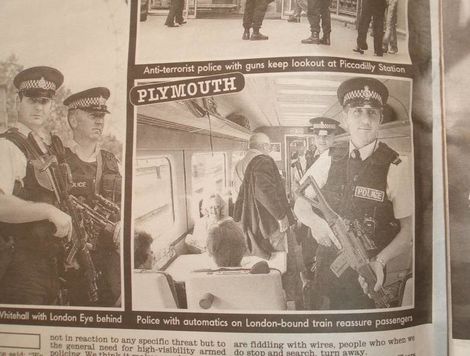
China
The Chinese government is organising "counter-terror exercises".[8]
UK
- Full article: CONTEST/Prevent
- Full article: CONTEST/Prevent
In 2003, the UK government adopted a "counter-terrorism" strategy of which one element was named "Prevent" (= "Preventing Violent Extremism"). This was widely criticised on a variety of grounds, in particular for emphasising on "Islamist terror", noting for example:
“The current threat from Islamist terrorism is serious and sustained. It is genuinely international in scope, involving a variety of groups, networks and individuals who are driven by particular violent and extremist beliefs. It is indiscriminate – aiming to cause mass casualties, regardless of the age, nationality, or religion of their victims; and the terrorists are often prepared to commit suicide to kill others. Overall, we judge that the scale of the threat is potentially still increasing and is not likely to diminish significantly for some years.
”
(July 2006) [9]
This is all the more remarkable since, according to Europol, less than 1% of terrorist incidents in Europe are by Islamic terrorists. Sociology professor David Miller has suggested that arms of the UK government such as MI5 are deliberately encouraging Islamophobia through such documents and through information provided to the commercially-controlled media.[10] This would fit with Sibel Edmonds' revelations about Operation Gladio B.
CONTEST
- Full article: CONTEST
- Full article: CONTEST
In 2003, the UK government launched CONTEST, a "counter-terrorism" strategy. This was focused on "Islamic terror" and was widely criticised by civil liberties advocates and others, who suggested that it was being used to excuse unwarranted mass surveillance.[11]
ACT: Action Counters Terrorism
- Full article: Action Counters Terrorism
- Full article: Action Counters Terrorism
In March 2017, the UK government launched ACT: Action Counters Terrorism, an updated "branding platform" for its "counter-terrorist" efforts.
US
In 2021 the FBI was using "counter-terrorists" to investigate people voicing their opinions on a variety of topics - primarily opponents of mask and vaccine mandates.[12]
Targets
"Counter-terrorist" teams are not used only on "terrorists". The military (SWAT team) ethos facilitates use of "counter-terrorist" forces on civilian targets such as Ian Puddick.[13]
Business
The global business of "counter-terrorism" has boomed since the attacks of September 11, 2001, resulting in a large expansion of everything from research and development of new mass surveillance technologies to conferences to "anti-terror legislation". New and heavily funded government agencies such as the US Department of Homeland Security with its Transportation Security Administration subsidiary have become a source of lucrative government contracts. A small number of large corporations have profited greatly from the ability to get these government contracts, often through an opaque process clouded with claims of "national security".
"Counter terrorism professionals usually possess at least a four-year bachelor’s degree and may look forward to a median salary of $77,210 annually."[14]
Effectiveness
Nafeez Ahmed wrote in December 2015 that data from the US state department reveals that concomitant with a great increase in expenditure on "Counter-terrorism", the number of "terrorist" attacks had increased by around 6500% since 2001.[15]
"Counter-extremism"
- Full article:
 “Counter-extremism”
“Counter-extremism”
- Full article:
The phrase "Counter-extremism" has been used fairly consistently since 2012, which is to some extent a drop-in replacement term for "Counter-terrorism", one that has been deliberately broadened in scope, to include "non-violent extremists".
Examples
| Page name | Description |
|---|---|
| "2014 Ukraine coup/Anti-Terrorist-Operation" | Olexander Turchynov, as acting President of Ukraine, announced the start of "anti-terrorist operation" against Donbas protestors in 2014. |
| "CIA/Counterterrorism Center" | |
| "National Counterterrorism Center" | In 2004, succeeded the "Terrorist Threat Integration Center" ... |
| "Terrorism/Preparation" | Terror drills are part of the "war on terror". In theory, they help defend against "terrorists". In practice, they are also used to stage false flag events. This article notes that many such events seem to coincide with or immediately presage actual attacks. |
| "War on Terror" | The campaign, launched by the USA under the Presidency of George W. Bush with the support of the UK, and most NATO members (at least formally) and other Western-aligned countries. Nominally a response to the events of 11 September 2001, its stated objective is the elimination of so called 'terrorist organisations', it was in fact conceived long before by a group of terrorist experts, including his father and the groundwork laid at a 1979 conference in Jerusalem as a propaganda term used to legitimise wars of aggression and a scare tactic. |
| 2006 Counter Terror World Summit | Bunch of "counter-terrorists" who met in London 2006 |
| 2015 Hawija bombing | A bombing of an IED plant that was ordered under suspicious circumstances went awry. Dutch Cabinet denied involvement, then denied any knowledge of the casualties until Dutch FOIA requests showed otherwise. |
| Action Counters Terrorism | A replacement for the highly criticised Prevent "branding platform" of "counter-terrorism". |
| Anti-Terrorist Hotline | A line for members of the public to report suspicion of "terrorism" |
| CONTEST | United Kingdom's "Counter-Terrorism" Strategy |
| CONTEST/Prevent | Part 2 of the UK's counter-terrorism strategy\ |
| Center on Global Counter-Terrorism Cooperation | |
| Combating Terrorism Center | |
| Counter Terrorism Command | |
| Emergency Response & Research Institute Inc. | A now defunct counter-terrorism outfit. |
| International Centre for Political Violence and Terrorism Research | |
| Evan Kohlmann | Georgetown University "counter-terrorist" |
| MI5/T Branch | |
| Metropolitan Police/Anti-Terrorist Branch | |
| Military Reaction Force | Covert UK Army hit squad |
| Vittorfranco Pisano | Spooky Italian "counter terrorist" academic member of the Integrity Initiative's Italian cluster |
| Security and Defence Learning | A sequence of 8 international conferences hosted by the New Security Foundation. "The event brings together academics, professional practitioners, security specialists, government officials and representatives of private sector companies for a discussion of key issues." |
| TOPOFF | A series of week long "counter-terrorism" exercises |
| UN/CTED | UN "counter-terrorist" group actively engaged in censorship of what it terms "extremist" material |
| UN/Counter-Terrorism Implementation Task Force | A part of the UN's "counter-terrorism" project. |
| UN/Office of Counter-Terrorism | |
| UN/SC/Counter-Terrorism Committee | A UN "counter-terrorism" body that was unanimously set up in the wake of the 9-11 event. |
| Richard Walton | Retired head of New Scotland Yard's Counter Terrorism Command |
| Karl Wycoff | US DoD contractor whose employers have included the NSA and US Cybercommand |
Related Quotations
| Page | Quote | Author | Date |
|---|---|---|---|
| Anthony Fauci | “After the 9/11 attacks, and the mysterious anthrax mailings that began a week later (which said, “TAKE PENACILIN [sic] NOW / DEATH TO AMERICA / DEATH TO ISRAEL / ALLAH IS GREAT”), the desire for biopreparedness became all consuming. Now there were emerging biothreats from humans as well as from the evolving natural world. Fauci’s anti-terror budget went from $53 million in 2001 to $1.7 billion in 2003.” | Anthony Fauci Nicholson Baker | 4 January 2021 |
| Internet/Censorship | “For some time to come, the delicate balance between freedom and security may have to shift” | Tony Abbott | September 2014 |
| Joint Special Operations Command | “The point of the 'Special Operations’ teams (SOT) is that they do not distinguish between civilian and military oppositions, between activists and their sympathizers and the armed resistance. The SOT specialize in establishing death squads and recruiting and training paramilitary forces to terrorize communities, neighborhoods and social movements opposing US client regimes. The SOT's 'counter-terrorism' is terrorism in reverse, focusing on socio-political groups between US proxies and the armed resistance. McChrystal's SOT targeted local and national insurgent leaders in Iraq, Afghanistan and Pakistan through commando raids and air strikes. McChrystal was a special favorite of Rumsfeld and Cheney because he was in charge of the 'direct action' forces of the 'Special Missions Units'. 'Direct Action' operative are the death-squads and torturers and their only engagement with the local population is to terrorize, and not to propagandize. They engage in 'propaganda of the dead', assassinating local leaders to 'teach' the locals to obey and submit to the occupation.” | James Petras | 2009 |
Related Documents
| Title | Type | Publication date | Author(s) | Description |
|---|---|---|---|---|
| Document:David Cameron's 'counter extremism' experts work with far-right Donald Trump sympathisers | Article | 19 December 2015 | Nafeez Mosaddeq Ahmed | The link between the two organisations (Henry Jackson Society and Quilliam Foundation) and Donald Trump is Frank Gaffney, who was the chief inspiration for Trump’s call to ban Muslims from entering the United States |
| Document:Former ambassador and Assange advocate Craig Murray detained under UK terror laws | Article | 17 October 2023 | Kit Klarenberg | When probed by counter-terror cops about the contents of his laptop, Craig Murray says he openly disclosed that the device contained copies of leaked private emails of Stewart McDonald, a hawkish, deep state-connected Scottish National Party MP: “I told the officers I pitied whichever poor bastard has to wade through McDonald’s emails,” he joked. |
| Document:The Astonishingly Crap Science of 'Counter-Extremism' | webpage | 17 March 2016 | Nafeez Mosaddeq Ahmed | An expose of the crass lack of any valid scientific basis of government strategies to fight radicalisation. Nafeez Ahmed agrues that the "most academically accurate concept to capture this absurd level of crappiness is ‘bullshit’". |
| Document:The Government Sector extract from The "Terrorism" Industry | book extract | 1989 | Gerry O'Sullivan Edward Herman | |
| Document:Unthinking extremism - Radicalising narratives that legitimise surveillance | paper | 26 October 2015 | Ben Harbisher | |
| The Power of Unreason | paper | August 2010 | Jamie Bartlett Carl Miller | A critique and deconstruction of an 'Official Narrative'-type paper on 'Conspiracy Theory' from the 'think-tank' publisher Demos. It includes an exchange of correspondence between its authors and a Wikispooks editor which is continued on the discussion page. |
An official example
| Name |
|---|
| Operation Nicole |
Rating
This article has good information, but lacks a historical overview of the topic, and could do better at clarifying the legal status of counter-terrorists.
References
- ↑ http://www.unwelcomeguests.net/750
- ↑ https://soundcloud.com/guns-and-butter-1/phoenix-as-the-model-for-homeland-security-and-the-war-on-terror-douglas-valentine-358
- ↑ McCoy, Alfred W. (2006). A question of torture: CIA interrogation, from the Cold War to the War on Terror. Macmillan. p. 63.
- ↑ http://www.unwelcomeguests.net/archive/747
- ↑ Document:The Astonishingly Crap Science of 'Counter-Extremism'
- ↑ http://www.unwelcomeguests.net/728
- ↑ https://www.thesun.co.uk/living/3726450/suspicious-behaviour-report-police-terror-attack/
- ↑ http://africasecuritycounterterrorism.com/chinese-armed-police-hold-anti-terror-drill-in-xinjiang/
- ↑ https://www.gov.uk/government/uploads/system/uploads/attachment_data/file/272320/6888.pdf Countering International Terrorism: The United Kingdom’s Strategy
- ↑ http://www.unwelcomeguests.net/672
- ↑ Government Anti-Terrorism Strategy Spies on Innocent 16 October 2009, the Guardian - accessed 25 November 2009
- ↑ https://www.zerohedge.com/political/doj-refuses-withdraw-memo-activating-fbi-counterterrorism-division-against-school-parents
- ↑ http://www.unwelcomeguests.net/672
- ↑ https://www.criminaljusticedegreeschools.com/criminal-justice-degrees/counterterrorism-degree/
- ↑ https://medium.com/insurge-intelligence/how-to-change-the-world-in-three-easy-steps-92d7ca576fc1#.yp92llqgn
